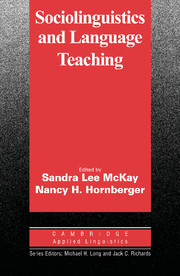Preface
Published online by Cambridge University Press: 22 July 2009
Summary
In many countries today, classrooms reflect a rich diversity of linguistic backgrounds. Students bring to the classroom not only other languages but also different varieties of English and culturally learned ways of using English. It is against this backdrop that teachers in general, and language teachers specifically, face the challenging task of respecting linguistic diversity while promoting common standards. Central to fulfilling this task is an understanding of the relationship between language and society, for it is the social context that both provides the conditions for linguistic diversity and reinforces the conventions necessary to maintain linguistic standards. The purpose of this book is to help language teachers and teachers of linguistically diverse and multicultural classes gain an understanding of the many ways in which language and society interact. It is addressed to pre-service and in-service teachers, primarily teachers in ESL/EFL and bilingual classrooms, teachers of linguistically and culturally diverse classes, and foreign language teachers.
Deciding how to present a text dealing with the relationship between language and society is problematic because some scholars in the field emphasize the manner in which social and political forces influence language use, often referred to as the sociology of language, whereas others focus on how language and language use reflect the larger society, at times referred to as sociolinguistics. In large part, the distinction rests on whether one emphasizes the society or the language.
- Type
- Chapter
- Information
- Sociolinguistics and Language Teaching , pp. ix - xiPublisher: Cambridge University PressPrint publication year: 1995



